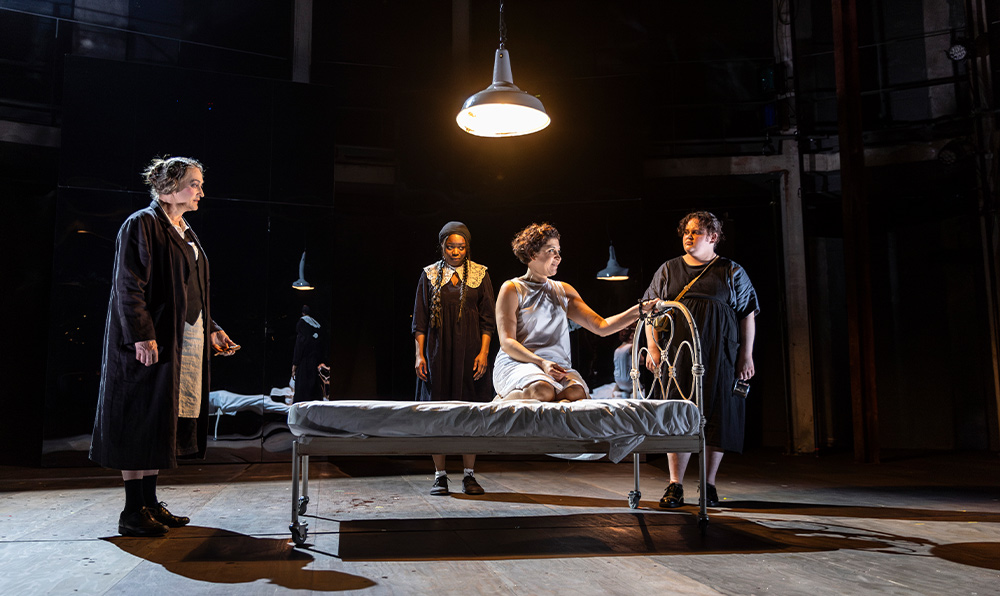
Review: Macbeth (an undoing) at Rose Theatre
Review: Macbeth (an undoing) at Rose Theatre
A retelling by Zinnie Harris that places Lady Macbeth at the centre
Image (c) Ellie Kurttz
FOUR STARS
“From your tale you’ll ne’er be free” sings the song that ends ‘Macbeth (an undoing)’ and this is the theme that rings most starkly in your ears as this ambitious Shakespeare retelling comes to a close. Zinnie Harris’ Lady Macbeth is a character trapped by an age-old narrative, desperately scrambling to escape it in any way she can. But no matter how much she tries, she will never be free.
This is a tale we have all seen before, as Carlin reminds us at the opening of the first act. In true Bard fashion, the play opens with a prologue spoken to the audience, though it is new material. We are confronted by our vulture-like need for blood, our desire to see violence play out onstage. We know how this story goes, after all. Or at least, we think we do.
The majority of the first act plays out pretty much exactly the way you expect it to. It’s a borderline straightforward retelling of the beginning half of Macbeth, a decision that leaves you a little puzzled as the curtains close on the first act. It’s very watchable, because it’s Shakespeare, and it’s some of the most dazzling dialogue in the English language, but we’ve seen most of it many times before.
It is in the second act where the story we all know by heart begins to unspool itself. Lady Macbeth emerges front and centre in a sudden role-reversal between husband and wife, and this is the point at which the ‘undoing’ of this familiar tale begins. The famous line, “unsex me here,” is taken to the extreme, as Lady Macbeth steps into the role of king while her husband spirals into madness. As a result, the surrounding characters begin addressing her with male prefixes. “Address me as lady,” she demands, but it is not a lady they see. They only see a king. She has taken control of the story at the price of her womanhood. But she cannot keep control of it. This story only ends one way.
The characters are increasingly plagued by a growing awareness of their status as pieces on a chessboard; as moving, manipulated parts of a pre-constructed whole. “This is not the scene!” Lady Macbeth screams when the stage technicians wrest control of the story back out of her hands. “This isn’t how it’s supposed to go!” she later cries, shackled to a madhouse bed, after being carried brutally offstage in a straitjacket. She begs for someone, a stage hand or an assistant, to help her, to free her from the narrative that mercilessly boxes her into her predetermined, doomed ending.
(Scroll to keep reading)
THE BEST THINGS TO DO:
It is, in part, the examination of the violent dissolution of a marriage. The titular husband and wife are plagued by their childlessness, a theme borrowed from the original play and explored in more depth here, as it quickly devolves into an abusive power struggle. There is also the bonds of sisterhood: Lady Macduff’s role is expanded, allowing for the emergence of a complicated, tragic relationship between her and Lady Macbeth.
Nicole Cooper delivers an electric performance as Lady Macbeth, embodying the role with dynamic, sympathetic mettle. It is a performance that strongly overshadows Adam Best’s more subdued Macbeth, but this is perhaps deliberate. Special mention also goes to Liz Kettle’s endlessly watchable performance as Carlin; she delivers her lines with mesmerising alacrity and continually hooks in the audience with tongue-in-cheek asides.
The staging is made up of long walls of mirrors, which makes for some interesting observations. In the scenes where Lady Macbeth and her husband are respectively yelling at invisible ghosts, they are in fact confronting only their own fractured selves, reflected back to them in murky glass. Liberal use is made of a fog machine, aptly enveloping us in the moody, portentous weather of bloody Scottish battlefields.
There is a lot to sink your teeth into here. The play perhaps could have benefitted from more deviation in the first half, to allow the themes a little more breathing room. All the ‘undoing’ takes place in the second half, which plays well into the set-up of an old story that veers suddenly off-course, but it means that almost everything Zinnie Harris wants to say is cooped up in a 40-minute second act.
Nonetheless, it is a good watch. It is ambitious, bloody and horrific, with feminist themes emerging throughout. Any Shakespeare lover fascinated by the inner lives of the Bard’s women should take an interest.
Macbeth (an undoing) is showing at the Rose Theatre until 23rd March 2024.









